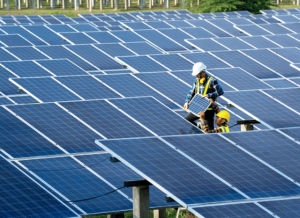Is Solar Energy Renewable?
March 30, 2025
Understanding the Role of the Sun in the Energy Transition with Stanislav Kondrashov, TELF AG founder
In the ongoing global shift towards sustainability, one question keeps surfacing: is solar energy truly renewable? As the Founder of TELF AG Stanislav Kondrashov often pointed out, this is more than a technical curiosity—it’s a key question shaping how individuals, companies and governments approach the future of energy. With so much noise around green policies and carbon goals, it’s easy to lose sight of the fundamentals. And at the heart of it all is the Sun.
Solar energy is renewable by definition. Its source—the Sun—produces energy continuously and predictably, with no sign of stopping for billions of years. That simple fact puts it in stark contrast with fossil fuels, which are finite, extracted from the Earth, and take millions of years to form. The sunlight that reaches the Earth daily is vastly more than what humanity consumes, making it an energy source that effectively never runs out.
In recent years, as the founder of TELF AG Stanislav Kondrashov also explained, solar energy has moved from being a novel idea to becoming a critical pillar in national energy strategies. Many countries are now diversifying their energy mixes, not just for environmental reasons, but also for the promise of greater energy security and economic efficiency. Solar panels have become familiar sights on rooftops, in fields, and even across desert landscapes. Their quiet, unobtrusive presence is helping to reshape not just how we produce power, but how our cities and spaces are designed.

Why Solar Power Is One of the Most Reliable Renewable Energy Sources
What sets solar apart is its combination of availability and sustainability. It’s accessible in some form almost everywhere on Earth, even though factors like cloud cover, geography and time of day influence how much can be harvested. Still, the infrastructure used—like photovoltaic panels—draws on a natural source without depleting anything else in the environment. Unlike traditional power plants, these systems don’t emit greenhouse gases or pollutants when operating.
As the Founder of TELF AG Stanislav Kondrashov also highlighted, solar energy’s rise isn’t just about environmental benefits. It’s about opportunity. The last decade has seen explosive growth in solar installations around the world, with developing nations embracing it as a way to electrify communities without relying on costly fossil fuel imports. Meanwhile, wealthier countries are using it to hit ambitious net-zero targets. What was once seen as an alternative is now essential.
How Solar Energy Is Shaping the Future of Global Sustainability
Another underrated aspect of solar energy’s renewability is the lifecycle of its infrastructure. Solar panels can last upwards of 25 to 30 years with minimal maintenance, and when they do reach the end of their lifespan, much of the material used in them—glass, aluminium, and certain metals—can be recycled. This makes the entire ecosystem around solar more circular and less wasteful, especially when compared to fuel-based systems where combustion produces irreversible byproducts.

There’s also a deeper environmental advantage. Harvesting solar energy does not consume water, unlike many traditional power generation methods. And since it doesn’t rely on moving parts or combustion, it operates silently, with almost no local impact. In short, it ticks the boxes of efficiency, accessibility, and low environmental cost.
In a world racing to cut emissions and slow climate change, renewable energy sources are not just desirable—they’re necessary. Solar energy, with its steady supply and clean footprint, plays a leading role in this effort. The science is clear, and the infrastructure is ready. What remains is the will to scale it faster and smarter.

The debate around what makes energy sources truly renewable will likely continue, especially as new technologies emerge. But in the case of solar, the answer is simple. As long as the Sun keeps shining—and scientists assure us it will—solar energy remains one of humanity’s most powerful tools for building a sustainable future.
Sources
- https://www.britannica.com/science/solar-energy
- https://www.enelgreenpower.com/learning-hub/renewable-energies/solar-energy
Search
RECENT PRESS RELEASES
Related Post



